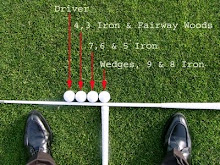The biggest story lately in golf is all about the new groove rule. Here is a story from PGA.com that should help you understand what all the talk is about.
Prior to 2010, a majority of golfers were using square grooves, or U-grooves. This was beneficial for high-caliber players as it allowed them to put an abundance of spin on their golf ball -- especially out of the rough -- because of the sharp, deep grooves on the clubs. In essence, the square grooves, on wedges particularly, were making it so that hitting a ball out of the rough wasn't as penal as it was intended to be.
With that, the USGA decided it was time to make a change -- one that has also been adopted by other governing bodies, including The PGA of America and the R&A. Essentially, the USGA has "rolled back" the grooves on all irons (not just wedges), reverting back to the previously approved V-grooves -- V-grooves are the most common, but under the new rule the grooves do not need to be V-shaped. They just have to be smaller and not as sharp as the old grooves.
Simply put, with the V-groove design, the grooves aren't as sharp as they were with U-grooves/square-grooves and aren't as far apart, which significantly decreases the amount of spin a player can put on a shot.
So what does the new groove rule mean to you, the average golfer?
According to USGA Senior Technical Director Dick Rugge, not much.
"The new grooves will have little effect on shots from the fairway or off the tee," Rugge said in a release explaining the new rule. "If you were able to spin a shot from the fairway with old grooves, you will be able to do it with new grooves as well. The new grooves primarily affect shots from the rough to the green by reducing spin. Most golfers don't hit greens from the rough very often."
Here's a look at the timeline created by the USGA in its process of implementing the rule:
January 2010 -- All new products submitted by manufacturers for USGA approval must conform to the new groove rule. All PGA Tour (and the U.S. Open) events will use new grooves.
January 2011 -- Manufacturers can no longer manufacture products with the pre-2010 grooves and can no longer ship products with the pre-2010 grooves. Retailers can continue to sell clubs shipped to them before this date as conforming clubs indefinitely.
January 2014 -- All USGA and R&A championships will require the new grooves (U.S. Amateur, U.S. Mid Amateur, etc.).
January 2020 -- The USGA will review the current rule and determine if it has had the desired effect.
January 2024 -- If the USGA approves of the direction the new groove rule is taking. This is the first possible date that golfers will need to have the new grooves to post scores for handicap purposes.
Basically, you have more than a decade before you need to get equipment with the new grooves. You can buy wedges today with the latest in groove technology and keep using them for another decade.
However, if you are a competitive player, you have a shorter timeline and will most likely want wedges with the new grooves for U.S. Open and U.S. Amateur qualifiers.
Any clubs you, the average golfer, buy before 2011 will be conforming for several more years. In essence, you can continue to purchase the best performing product available since it won't be available for long.
Cleveland Golf -- one of the game's top manufacturers -- points out that there is, however, a caveat to all of that.
"You can repair your current clubs going forward (re-grip, new shaft), but you cannot touch the head without making the club non-conforming," Cleveland Golf says in its explanation of the new rule. "Any clubs with the current grooves (pre-2010) cannot have the grooves re-finished or sharpened. Any work done on the face of the club will cause it to be considered non-conforming. This comes back to the integrity portion of the rules. Will anyone be standing by the handicap posting station next year to check if you had your current grooves sharpened? No, but you will know you did and in turn using them is a violation of the rules. You need to call the penalty on yourself."
Subscribe to:
Post Comments (Atom)





No comments:
Post a Comment